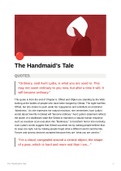🔴
The Handmaid’s Tale
QUOTES
“Ordinary, said Aunt Lydia, is what you are used to. This
may not seem ordinary to you now, but after a time it will. It
will become ordinary.”
This quote is from the end of Chapter 6. Offred and Ofglen are standing by the Wall,
looking at the bodies of people who have been hanged by Gilead. The sight horrifies
Offred, but she strains to push aside her repugnance and substitute an emotional
“blankness.” As she represses her natural revulsion, she remembers Aunt Lydia’s
words about how life in Gilead will “become ordinary.” Aunt Lydia’s statement reflects
the power of a totalitarian state like Gilead to transform a natural human response
such as revulsion at an execution into “blankness,” to transform horror into normalcy.
Aunt Lydia’s words suggest that Gilead succeeds not by making people believe that
its ways are right, but by making people forget what a different world could be like.
Torture and tyranny become accepted because they are “what you are used to.”
“I’m a cloud, congealed around a central object, the shape
of a pear, which is hard and more real than I am…”
The Handmaid’s Tale 1
, This passage is from Chapter 13, when Offred sits in the bath, naked, and contrasts
the way she used to think about her body to the way she thinks about it now. Before,
her body was an instrument, an extension of her self; now, her self no longer
matters, and her body is only important because of its “central object,” her womb,
which can bear a child. Offred’s musings show that she has internalised Gilead’s
attitude toward women, which treats them not as individuals but as objects only
important for the children that they can bear. Women’s wombs are a “national
resource,” the state insists, using language that dehumanises women and reduces
them to, as Offred puts it, “a cloud, congealed around a central object, which is hard
and more real than I am.”
“How easy it is to invent a humanity, for anyone at all. What
an available temptation.”
Offred remembers a documentary that she watched about a woman who was the
mistress of a Nazi death camp guard. She recalls how the woman insisted that her
lover was not a “monster,” and she compares that woman’s situation to her own, as
she spends her evenings with the Commander and comes to almost like him. The
Commander seems like a good person: he is kind, friendly, genial, and even courtly
to Offred. Yet he is also the agent of her oppression—both directly, as her
Commander, and indirectly, through his role in constructing the oppressive edifice of
Gileadean society. Like the concentration camp guard, he is “not a monster, to her”;
yet he is still a monster. Offred suggests that it is “easy,” when you know an evil
person on a personal level, to “invent a humanity” for them. It is a “temptation,” she
says, meaning that no one wants to believe that someone they know is a monster.
But in the case of the Commander, that temptation must be resisted. He may be kind
and gentle, but he still bears responsibility for the evil of Gilead.
“…not even stockings on them, no wonder these things
used to happen.”
Offred recalls Aunt Lydia’s account of how women used to behave, particularly in the
warm times of year. Aunt Lydia postulates that when women dressed provocatively,
they invited men to take advantage of them. By saying that crimes wouldn’t happen
to nice women who cover themselves up, Aunt Lydia places all the blame on the
women who are the victims rather than on the men who are the perpetrators. Aunt
Lydia’s practice of blaming women performs an important role of indoctrination in
Gilead’s mandated conformity.
The Handmaid’s Tale 2




